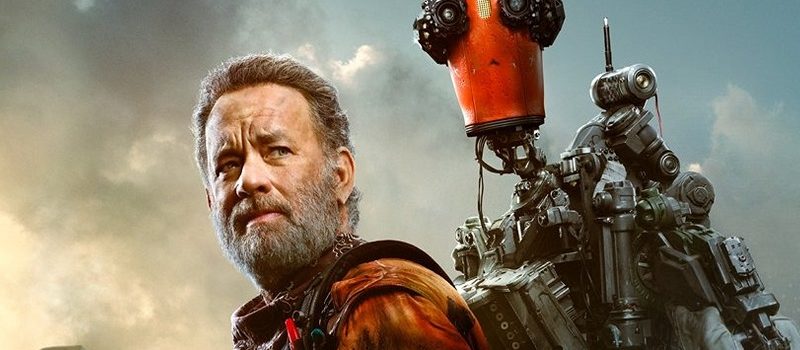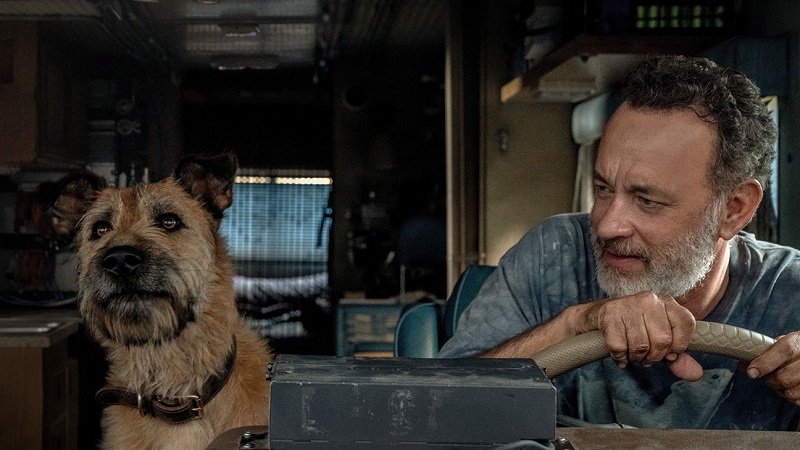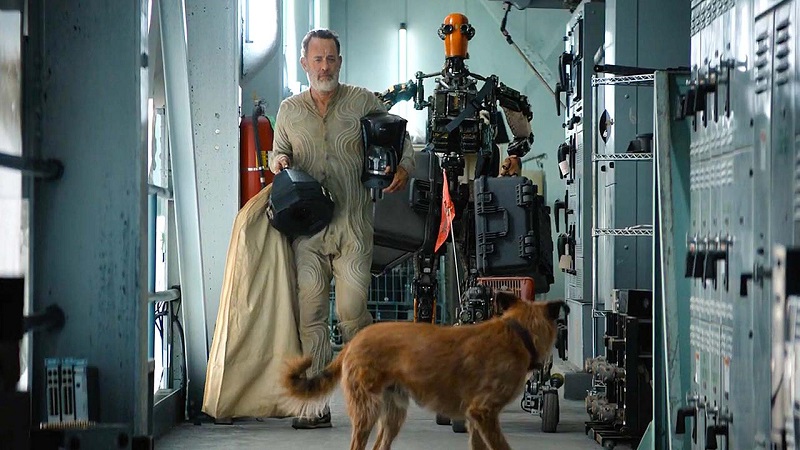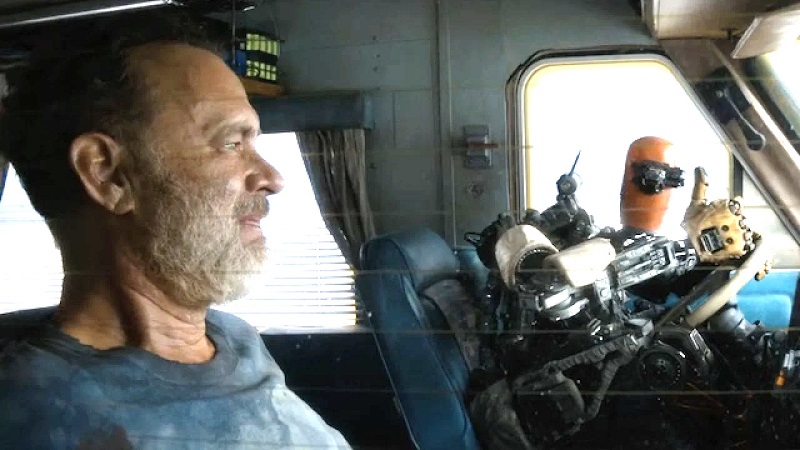In the apocalyptic drama, Finch, Tom Hanks shows us how far man will go for his canine best friend, even if that means a road trip across the end of the world.
Finch Weinberg (Hanks) is an engineer who builds a robot to take care of his dog, Goodyear after he passes. But in order to be successful in his mission, he must also teach his robot creation, Jeff (voiced by Caleb Landry Jones), how to feel alive.
During a recent press day, The Movie Mensch was able to speak to Hanks about the film and how it differs from Cast Away, what he looks for in roles, and what the movie means to him.
Hanks first spoke about how much he admired Director Miguel Sapochnik’s work on Game of Thrones. “Every time I saw an episode of Game of Thrones, I would go to him and ask, “How did you make that episode?” Hanks recalled. “Every time I saw an episode of Game of Thrones, I would go to him and ask, “How did you make that episode?”
Hanks continued to speak about the “nine million pieces that all have to interlock” and then went on to touch on to shed light on how for Finch, it was the most “detailed sit-down rehearsal period” that the Academy Award-winning actor had ever been a part of. “It was specific, with every single beat and every single sentence,” he added.
Hanks said he and Sapochnik would talk for at least “six hours per day, if not more.”
He went on to praise Sapochnik for being a “smart director,” suggesting “he knows what he’s going to use and what is going to make the final cut.”
“There were plenty of times where I invested heavily in stuff that was important to me, and he said the smartest thing a director could say to an actor, which was, ‘Great, go ahead. I love it.’ And it’s not in the movie. He knew it wasn’t gonna be in the movie, but at the same time, I got to work out my process,” Hanks joked.
Hanks also spoke about his bonding process with the dog, Seamus. “There’s a week’s long process, of me spending as much time as possible with Seamus, in which he’s never looking at me. He’s always looking at [his handlers]. That’s just the reality.” He then touched on how they connected behind the scenes, saying: “There are photographs of Seamus and I, in between shots, in the back, laying down in the bed, and both of us are taking a snooze.”
The seasoned actor continued to speak about the blending of genres and buddy road trip scenes. Hanks recalled that his “first job, as an actor, was in a rotating repertory theater.” According to Hanks, this is “the greatest job an actor can have because there is such a variety that is demanded of you.”
“You don’t really have to make any choices. Years ago, in 1977 at the Great Lakes Shakespeare Festival, we did six plays a year. There was a comedy, a historical, a tragedy, something contemporary, and something made up. The job of the actor was to live up to the text and the expectations of what each individual play was. When you get into film or television, those are singular decisions that you make. The job is the job, and the text is the text,” Hanks asserted.
He went on to explain that “it’s always about, what does the story examine, by way of the theme that it’s talking about, and then how do we get there? That’s just fun. In every comedy I’ve done, there’s been some serious moments. And in every serious movie I’ve done, there have been some comedic moments. That’s the way life is. The great pleasure of this is that you start all over from square one, as soon as you say yes to a movie and nothing you’ve done prior to that matters, outside of whatever countenance that you’re carrying along into the movie in the first place. The movie is the movie. This is bleak in the extreme, and yet many of the scenes with that dog and the scenes with Jeff are pleasant to watch because they’re recognizably human. Otherwise, you’re just playing the same drag beat, over and over and over and over and over.”
Hanks then shifted focus to what he looks for in new projects, joking: “I’m an old man now and it’s hard to get out of bed sometimes, at 5:45 or 5:15 in the morning, but you can’t help it do it because, at the end of the day, this is just the greatest job in the world. There’s nothing that compares to it. Whatever the movie is, it has to reflect what I think my own sense of logic is, true behavior, and true procedure.”
“Whether it’s The Godfather or Halloween, it’s about, what would I do under these same circumstances? If I don’t know what that is because there’s no logic to it or I don’t understand it, then I’m not invested in what’s going on,” the two-time Oscar winner said.
Similar to I Am Legend, Finch uses music to cope with the loneliness of being the last human on Earth. One journalist asked Hanks which albums he would take with him if he were in that situation.
“I would have a Julie London album. Julie London was a smoky saloon singer from back in the ‘60s, who did a lot of covers. She was a formidable woman with a formidable voice. I would have to have a very, very, very, very basic 4/4 time rock and roll album, like a collection of Chuck Berry’s greatest hits, not just for the beat and not just for the percussive guitar aspect, but that guy actually wrote lyrics that were incredibly subtle and bits of urban poetry for its time. I’d probably take something by Mr. Bruce Springsteen, probably Darkness on the Edge of Town because that is one major road opera right there. I’d throw in Dusty Springfield. Her Dusty in Memphis record has that English soulful sound, by way of Chess Records out of Memphis. That’s beautiful stuff. And then, if I was gonna be alone, I’d take one of my wife’s records. I’d take a record by Rita Wilson, maybe Bigger Picture,” Hanks claimed.
In the film, the apocalypse is caused by holes in the ozone layer. One reporter asked Hanks if audiences should take Finch as a warning or just appreciate for what it is: a relationship between man, a dog, and a dog’s robot.
“That’s an interesting question,” Hanks remarked. “Because the place where we actually do make a stab at getting into recognizable human behavior is in the flashbacks to when society was still beginning to crumble. Miguel and I talked a huge amount about what those short sequences were going to be. They had to be recognizable as human behavior, and not just plot devices, and it had to communicate how important such a thing as a bag of noodles could be to somebody’s survival, but it also had to reach back into a grander circle of people that we would recognize. If you were all by yourself, what would you do? You’d go into every store and try to make off with a bunch of noodles. But if you were a mother with a daughter and you were trying to do the same thing, what would you do? How would you protect both of you? And if you were a guy with a family somewhere in a car and everybody had guns, all of a sudden, and everybody was fighting for themselves, what position would that put you in?”
He went on to explain that “the ozone and the environmental aspect of it is a huge concern. I did a movie down in Australia and I can’t tell you how many skin clinics exist around there, simply because there is a hole in the ozone down there and skin cancer is a worry for people.”
“All of this stuff has been accumulating all of this time, and if it’s not getting worse, it’s certainly becoming more and more a part of the consciousness because we see the evidence of it. So, you take that and you don’t wanna make a movie that is preaching about something that is common sense, but you do wanna tell a story that is going to try to examine what happens to us all in extreme circumstances. When the screenplay talks about how first everybody tried to pretend it wasn’t existing, then everybody tried to hide, then everybody tried to hoard, and once that ran out, the rules changed. That’s not hard to imagine and it’s really quite horrifying. So, if there is some cautionary tale in Finch, it’s that. What are we gonna do, to and for each other, when the hurricane comes, or the floods come, or the ozone is so bare that the sun can cook a hot dog, just by sitting outside,” he exclaimed.
Lastly, Hanks shined a light on the differences between Finch and Cast Away, pointing out that, “Cast Away took the better part of six years to make happen, so there was a constant ongoing discussion about what we were examining, and myself, (writer) Bill Broyles, and (director) Bob Zemeckis were constantly arguing about it.”
“If you asked us now, each of you would give you three different answers for what it examines. For myself, as one of the originators of Cast Away, that movie is about the best thing that ever happened to this man. He was in a plane crash and lived on an island for four years, and from that came this life that he never would have imagined that he’d have. That’s not the theme of Finch. Nothing great happened to Finch. His time is limited. This dog means responsibility and love, and a whole different connection. The quest for permanence in some brand of eternal effect that Finch is looking for, in creating Jeff the robot, so that he can take care of Goodyear the dog, is a different course in the seminary of solitude versus loneliness and survival versus flourishing,” he explained.
Hanks went on to a philosophical asset that he is “a bit drawn towards these questions of, how much of behavior and protocol can actually define us and save us from ourselves? How do we get to the place where our insides match our outsides?”
“I am drawn to that kind of stuff, not just in movies that I do, but in movies that I watch and am a fan of. It’s extremely different, and yet there is a degree of countenance that goes along with it. There’s a way that Chuck Noland walked around the island searching for food that is reflected in the very first scenes of Finch, where you see this guy in this pressure suit, trying to survive the elements and, hopefully, if he gets lucky, there are some cans of leftover tuna in this store that he’s going into. It’s common turf, but I think it’s a different sermon,” he clarified.
Finch is on Apple+ currently, and this is one road trip that you do not want to miss.





